Pride and Prejudice. It’s one of the most beloved and widely read novels in the English language. Everyone knows Mr. Darcy and Elizabeth and their love overcoming all odds. Everyone loves to adapt it. You sometimes get the impression that whenever writers have no clue what to do next, they say, “let’s just adapt Pride and Prejudice!”
And this text is so well known that straight adaptations are no longer necessary. You can have Pride and Prejudice in another time and place, from India to Utah. You can have time-travelling Pride and Prejudice; you can have Pride and Prejudice and Zombies.
 And then, apparently, you can adapt that into a film. And they have. It comes out today, in fact. Stay tuned for my thoughts on it. But in order to prepare for what I’m sure will be a great intellectual challenge, I made the rather rash decision to provide the world with a definitive guide to all the adaptations of this novel made in English. (This means I won’t be watching the K-Drama. Sorry.)
And then, apparently, you can adapt that into a film. And they have. It comes out today, in fact. Stay tuned for my thoughts on it. But in order to prepare for what I’m sure will be a great intellectual challenge, I made the rather rash decision to provide the world with a definitive guide to all the adaptations of this novel made in English. (This means I won’t be watching the K-Drama. Sorry.)
These adaptations have come early and often since the invention of film, though many of the earlier examples are impossible to find, if they survive at all. There have also been quite a few works that were clearly very directly inspired by the novel even if there’s no Hertfordshire.
All you need to two hot people and a swooning romance, right?
Except no. Jane Austen didn’t write a swooning romance. Jane Austen wrote a morality story about what she felt was the ideal marriage: an arrangement arrived at by two rational people based on the intersection of affection, practicality, spiritually duty, and compatibility.
Pride and Prejudice (P&P), an understanding of this theme is what I look for most. There are six “touchstones,” as I call them, that help focus this. How these elements are adapted makes the difference between a good adaptation of Pride and Prejudice, and a generic romance movie.
- Elizabeth – This young woman is intelligent, opinionated, independently minded, and yeah, kind of proud. However, she is also a product of her time. She doesn’t think she’ll ever marry because she knows few men are really her intellectual or moral superior. And a husband must always be his wife’s superior.
- Darcy – Dude, your privilege is showing. Fitzwilliam Darcy is a hot brooding guy, and that makes him super sexy, but it’s because he’s an entitled snob. He suffers when Elizabeth rejects him, but make no mistake, he went in there with no doubt that she would accept him because, you know, he’s Mr. Darcy. He’s essentially a good person, which is why he’s able to learn to be less of a jerk by the end, but he was simply not the aggrieved party here.
- Mr. Wickham and Lydia – This one is tricky. Because in today’s world, when a man in his late twenties runs off with a sixteen-year-old our first thought usually isn’t “oh no! her reputation!” But we’re supposed to feel sorry for Lydia, because she wasn’t raised right, but also think that she’s damn lucky Mr. Darcy got that sweet deal for her so that she wouldn’t have to be a street walker. Wickham is the cautionary tale that all the young female readers should watch out for.
- Charlotte Lucas – She is meant to be the opposite of Lydia. Marrying for purely pragmatic reasons is just as bad as marrying because you can’t keep it in your pants.
- Mary – Back in the early nineteenth century, a woman trying to be an intellectual was seen as, like, funny. I don’t think we’re supposed to be all “yay, go book snob!” This often ends up in a narrative that is rather cruel to poor Mary, but that’s what the text is. Her complete rejection of social interactions in favour of “contemplation and reflection” is not praiseworthy, it’s ridiculous.
- Mr. and Mrs. Bennet – Mrs. Bennet is really dumb and shallow, but Mr. Bennet is a complete jerk. His duty is to provide for his family, to make sure his daughters are taken care of, but he doesn’t. He just locks himself up in his room and laughs at them, and encourages Elizabeth to do the same. He’s redeemable because he’s clearly loves Elizabeth, but he is not an unproblematic fave.
This not to say that a film that is a “poor” adaptation of the novel is necessarily a bad movie, or that a good adaptation is necessarily an excellent television show, but adaptations are kinda my thing, so that’s the angle that I’ll be taking.
Direct Adaptations
Pride and Prejudice (1940)
 So one of the maxims of adaptation, as articulated by David Selznick, is to not presume to “fix” what you see as structural flaws in the source material. Wouldn’t it be better if Darcy was actually a great guy who made, like, one rude comment once but was otherwise perfectly nice? Wouldn’t it be nice if Elizabeth immediately fell in love with him after hearing his sob story because… um, pity? He’s so Nice™? Wouldn’t it make more sense if Lady Catherine gave her blessing in the end?
So one of the maxims of adaptation, as articulated by David Selznick, is to not presume to “fix” what you see as structural flaws in the source material. Wouldn’t it be better if Darcy was actually a great guy who made, like, one rude comment once but was otherwise perfectly nice? Wouldn’t it be nice if Elizabeth immediately fell in love with him after hearing his sob story because… um, pity? He’s so Nice™? Wouldn’t it make more sense if Lady Catherine gave her blessing in the end?
No, it wouldn’t.
I feel bad being hard on this movie, since it’s so old. But there’s something about it that’s so pandering to sentiment. Like, everyone’s exaggerated curtseying when they danced. And there’s the “funny” little moments where the Bennet sisters were literally indistinguishable from a flock of noisy hens. Maybe it’s just a product of its age, but in that case, it aged very badly.

Elizabeth seems more rude than anything. This is mostly a consequence of the Tyrion-esque whitewashing of Darcy. He made one rude comment, then immediately tried to make up for it by asking her to dance, and she was all “nope!” then went to dance with someone else. After that, he was nothing but trying to be pleasant for the rest of the movie, while she was just constantly telling everyone how much he sucks and being passive agressive. We’re told that he’s proud, but he hardly acts like it. This is a story about how Elizabeth was an idiot and a bad judge of character.
Lydia and Wickham were okay, I guess. It was mostly used to make jokes about how they have to move or something. Charlotte’s marriage was glossed over, and so was Mr. Bennet. He complained about noise once. Mary, was Mary-like, I suppose.
It feels rather like this is only incidentally Pride and Prejudice; like someone wanted to make a silly romance film rather than an adaptation. I can’t really recommend it as either.
Pride and Prejudice (2005)

This movie is a really good movie. Even if Jane Austen were never born, I would recommend everyone see this movie. The camera work was just… those tracking shots… The direction in general is exceptional. And Keira Knightley deserved that Oscar.
As an adaptation, I find this movie rather difficult to discuss, because it got many things quite wrong—significant things—but it is Pride and Prejudice, in its essence. Though I have trouble explaining how. So, even though most of the things I will discuss are rather negative, it’s still a good adaptation. Especially considering this movie is barely two hours long. They did read their Selznick.
As I’ve already mentioned, Keira Knightley’s performance deserves all the praise. She’s almost always the smartest person in the room, but she’s not a jerk about that. There’s nothing particularly Darcy-esque about Darcy though. He’s not enough of a jerk to really justify Elizabeth’s dislike. So the story becomes more about her learning how awesome he is, rather than him learning not to be a jerk and her learning that people are complicated.

This was rather aggressively brought home in the last few minutes of the movie when Elizabeth states “He’s not proud. I was wrong, entirely wrong about him.” No, she wasn’t. He was proud. And also prejudiced. And so was she. But this Mr. Darcy wouldn’t let that happen.
And in general, their relationship was rather over-romanticized. This is exemplified by Darcy’s flowery pronouncement of love towards the end. I was not of fan of this.
Much of the Wickham and Lydia material is fairly glossed over, but considering the length of the movie, I won’t fault them for that. The essentials were there. Mary was wonderful. She didn’t have much in common with Mary, but Talulah Riley stole every scene she was in with her background eye rolling. I think Mary was drunk at the ball in the beginning? Charlotte Lucas’s content is all there, and in-tact. My complaint is that it’s all rather spoonfed. We didn’t need to be told so explicitly about her motives for marrying Mr. Collins.
Mr. Bennet is more or less completely white-washed. Apart from one passing comment about how he puts “peace and quiet” above everything, he’s a really nice guy. And a good husband and father. And he’s really concerned with porcine husbandry.
And yeah, the pig balls.

I think the production design was going for a “gritty and realistic” look, so there’s mud everywhere and people have messy hair sometimes. This is fine in principle, but it leads to two things. Firstly, it makes the Bennets seem a lot less well off then they clearly are in the text, and secondly, it leads to behaviour that seems rather anachronistic. Like Elizabeth walking from Pemberley to the inn. In the dark. It’s a little distracting.
There are a few other little things, like the random line assignments that always drive me nuts, but I think the merits of this film as a film allow me to overlook a great deal.
Pride and Prejudice: The Lost Series (1952, 1958, 1967)
All Doctor Who fans can understand the pain of wanting to see an old piece of television and not being able to find it, possibly because it no longer exists. I’m not sure if these three series have gone the way of The Power of the Daleks, or if they’re just sitting somewhere waiting to be released one day, but I was unable to find any of them.
There is a very low quality copy of one half-hour episode of the 1967 series on YouTube that suggests that it’s watchable, if oddly paced, and some stills that can give you a very rough idea of the others.
It is really too bad, because the idea of Grand Moff Tarkin as Mr. Darcy is a very exciting one to me.
1952:

1958:
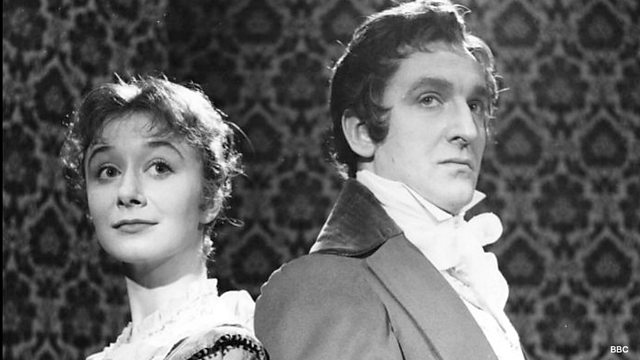
67:

Pride and Prejudice (1980)
There’s a point where funny things aren’t funny because they’re actually humorous, but because they’re so camp.The distinction is sometimes a little ineffable, but I think in this case, the campiness of this particular five-part miniseries can be put down to a lack of naturalism.
This series is a successful adaptation; you can tell it gets to source material, but it’s not nearly as enjoyable to watch as some other versions. Not that it’s bad exactly…
The acting in this work is rather distracting. It’s got this exaggerated quality that never lets you forget for one second that you’re watching people act instead of real people. And the scripting was perhaps not the best. There was a determination to stick in as many bits from the novel’s narration into the dialogue as possible. Unfortunately, many of those lines are narration rather than dialogue for a reason. And characters randomly get each other’s lines. That’s not necessarily bad, but it’s quite distracting when you know a text as well as I know Pride and Prejudice.

The characters were sometimes more like caricatures. The one that stands out the most in this regard is Lady Catherine DeBourgh, whose fondness for giving unsolicited advice now extends to actually going to the butcher and changing people’s orders. And an inflatable top-hat. (No, really.)
Elizabeth is quite good. Darcy is a little too stiff throughout. I’m still not sure why she would be into him by the end. Lydia’s post-marriage silliness is very silly, but it’s meant to be.
Then there is Mary. I’m not sure what they were going for with her. She has the inept attempts at booksmarts, but also an obsession with gossip that rivals Lydia. I think maybe she’s supposed to be a hypocrite? In any case she’s more a clown than a buttmonkey.
Mr. Bennet is not at all white-washed. I would consider this a good thing. He is often downright cruel to Mrs. Bennet and the younger daughters. He literally hides in the library. The only complaint I have about it is that it may be a caricature as well, and a tad spoonfed. But this is a general problem with the fact that there is use of inner-monologue voiceover to express Elizabeth’s feelings about things. And inner-monologue voiceover is always a mistake.
I’m making this series sound worse than it was; it had a lot going for it. It didn’t try to “improve” the source material to be more in keeping with contemporary sensibilities, which is good. Most of the performances are fine. And there’s little details that amuse me. Like, how derpy the dancing is. They obviously didn’t spend hours rehearsing, which is a nice realistic touch, even if that sounds strange when juxtaposed with the performances. And all the women are constantly sewing, which was a thing in the days when all clothes were made by hand.
Pride and Prejudice (1995)
It will probably not shock anyone that this is by far my favourite adaptation of Pride and Prejudice. In fact, it may be one of my favourite adaptation of anything, as well as one of my favourite pieces of television.
This production had a lot of things stacked in its favour: excellent casting, the budget for meticulously accurate costumes and sets, access to perfect locations. But it’s the writing that makes it so wonderful.
Yes, it’s more or less a dramatic reading of the book, and a television mini-series lets you do that in ways a movie does not, but that’s not as easy as it looks. Books and tv shows have different beats they have to hit; TV has episodes that also need to have beginnings, middles, and ends. But this is also good TV. It’s just good.

As for the touchstones, this version is also the best. The patriarchal view of marriage is a tad deemphasized. Mr. Bennet’s comment about how Elizabeth could only marry a man who is her superior is one of the few bits of interaction between them that’s entirely omitted. In general, however, the moderation in Elizabeth’s character (“I deserve neither such praise nor such censure. I am not a great reader, and take pleasure in many things.”) is very well portrayed.
Colin Firth’s Darcy has become a sex-symbol, though your fave is problematic, ladies and gentleman. But he’s also quite likable by the end and his contrition and rather desperate attempts to please Elizabeth when she shows up at Pemberly are adorable. I approve.

Charlotte is perfect, and the additional material with Lydia and Wickham, where she’s giddy about having sex before any of her sisters, is very appropriate and effective. Mary ends up being a buttmonkey, but like I say, this is not inappropriate from an adaptational perspective; her performance of being an “intellectual” is supposed to be laughed at. The added bits about her fruitless attempts to get Mr. Collins’s attention seem very natural. Fans have been saying for two hundred years how those two are perfect for each other.
Mr. Bennet is the best, though. It’s very hard for us to really understand how few options “respectable” women had outside of marriage in this period. And for women like the Bennet sisters who have no money of their own (a circumstance that’s entirely Mr. Bennet’s fault. He never bothered to save anything for them.) Mr. Bennet’s refusal to play the marriage-hunt game is neglect. Pure and simple. Dude locks himself in his library and laughs at everyone when he’s supposed to be worrying about the future. This adaptation makes that clear, without spoonfeeding it in the manner of the 1980 version.
Looser Adaptations
Bridget Jones’s Diary (2001)
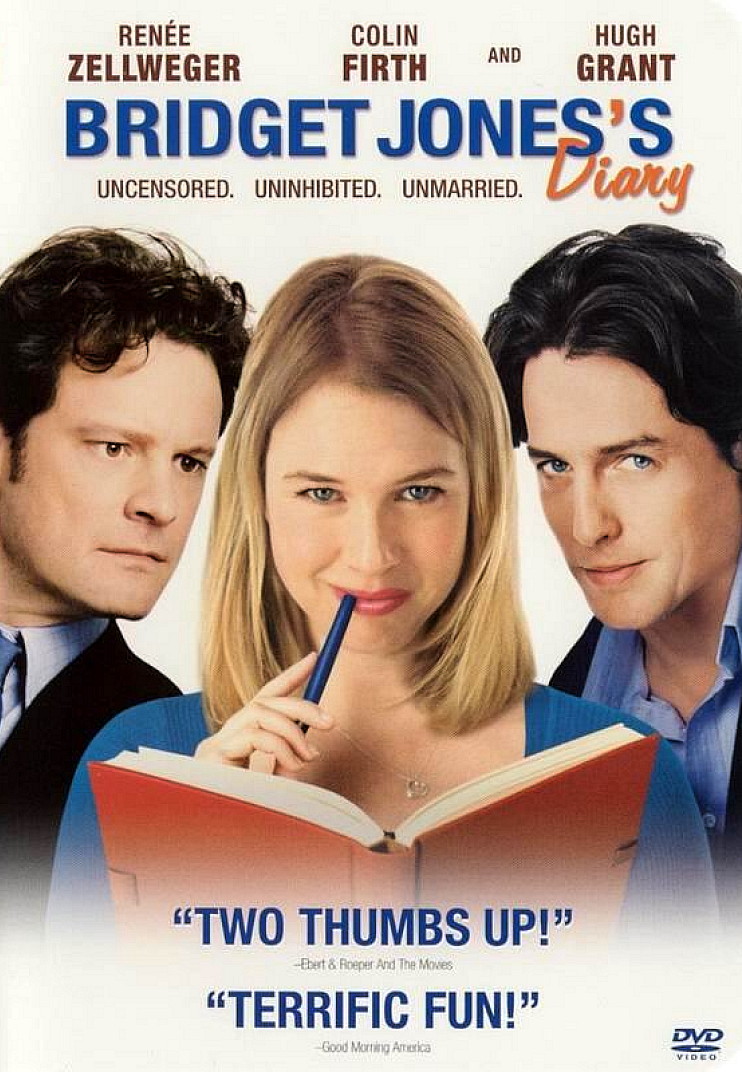
Now that I’ve seen this movie again, (I haven’t seen it in many years) I’m a little confused as to why it’s on this list, even as a “loose” adaptation. Apart from the obvious conscious references to Pride and Prejudice, I don’t see what it and Bridget Jones’s Diary particularly have in common.
Really, I’m only including it because people will yell at me if I don’t. Character is the most important element when making an adaptation, especially with an “alternative universe” adaptation, and since that’s entirely absent, there’s very little to talk about.
Bridget and Elizabeth are both English and cis-women but other than that… Elizabeth has a self-confidence in herself and her values that Bridget simply doesn’t. Bridget is just a desperately unhappy person who seems to really hate herself and everything about her life. I don’t get why anyone would like her, let alone why a sexy human-rights lawyer would fall in love with her.
I’m not saying that shallow, unpleasant people with limited intelligence don’t deserve to find love and be happy, but how many movies do I have to watch about it?
Bad first impressions and the two bottom points of a love triangle having a past are necessary elements of P&P, but they are hardly sufficient.

As for this film as a film… Wasn’t this super popular when it came out? Did it just age very badly? I mean, this is about a woman who seems financially independent, has supportive friends, a BMI in the healthy range, and a career that finally is going somewhere. But she is miserable because she ain’t got no man.
Oh, and the amount of sexual harassment and casual homophobia is a tad shocking.
Is Bridget supposed to be a villain protagonist? Are single women in their thirties supposed to be able to relate to her?
In any case, I’ll pass.
Pride & Prejudice: A Latter-Day Comedy (2003)

Modern AU fan fiction is a thing, and someone decided to make a movie out of it. And make it Mormon?
This is a strange movie, and it might be more constructive to see it as a low-budget independent comedy from a subsection of religious cinema than an adaptation of Pride and Prejudice, but they gave it the name they did, so here we are.
In an odd way, the LDS (Latter-Day Saints, or Mormons) elements only help this movie. It’s a good way to explain why all these young twenty-somethings are all looking for spouses instead of just humping like bunnies. But there was this whole idea throughout that women can be trusted with their own chastity, which I think Austen would appreciate.
Most of the things that seem uncomfortably sexist were not strictly necessary from an adaptational perspective, like Caroline Bingley and her last minute cat-fight and marriage to a septuagenarian. (She was forced to have his babies! Ha!) And let’s not discuss how Jane is now a sexy (for a Mormon) Latina and Flamenco music plays whenever she and Bingley make eye-contact.

Elizabeth is as Elizabeth-like as anyone in a Modern AU can be, I think. She’s independently minded and opinionated, but her values are, at heart, quite traditional. But she has this one moment of supreme immaturity that really rubbed me the wrong way. If you watch the film, you will probably know what moment I mean immediately.
Darcy, is not Darcy in any way, except that he was rude at a party once. He’s really more of a generic Rom-Com guy. Mr. and Mrs. Bennet are omitted, and Charlotte is a cameo by an American Idol contestant. Oh, and Mary is a super religious frumpy girl who ends up with Mr. Collins. Once she gets a makeover. Very Empowering.
The Lydia/Wickham thing gets something done with it, even though you would think it would be the hardest thing to adapt. Lydia herself was brought forward in an odd way. She reads a self-help book about dating.
In summary, not a good movie, but a decent adaptation, given what it had to work with. The LDS elements allowed the themes of the source material to actually be present. Sort of. If you squint.
Bride and Prejudice (2004)

Bollywood Pride and Prejudice? I know how it sounds, but hear me out.
This movie just fills me with nothing but positive emotions. It’s so obviously made with the best intentions, and everyone involved is clearly having fun. Like, I challenge anyone to watch this and not grin like an idiot.
As an adaptation, there are some problems, but considering the fact that this movie is under two hours, and how well they translated the major characters and themes, I just can’t help but forgive everything.
Lalita is very Elizabeth-like: she knows what she wants out of life and she’s not going to compromise on it. She not afraid to express her opinion, but she clearly belongs to her time and place. Darcy’s classism is translated more into an imperialist chauvinism but, again, it works. And I liked Maya’s Cobra Dance.
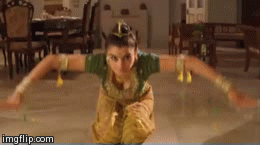
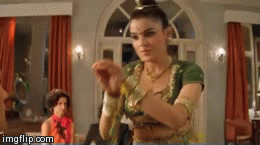
The whole thing with Lakhi and Wickham was less successful. It was rushed and, like, had no consequences whatsoever. I’m quite sure someone actually says, “It’s fine, she’s back now.” It was a flaw. A rather glaring one, but it didn’t break the movie. Mrs. Bakshi is… well, she’s Mrs. Bennet with an account on an online matchmaking service.
This film also makes liberal use of Selznick’s third maxim by rearranging the order of events, and compressing some things. But the resulting story is coherent and easy enough to follow, so again, it’s not a really a “problem”.
And yes, I do know this is technically not Bollywood, just “Bollywood Style.” I still like it. If your mood ever needs a boost you should check this movie out.
The Lizzie Bennet Diaries (2012–2013)

So, a lot had changed in the last two hundred years. The expectations women have for ourselves and our lives are just unrecognizable. The way we see romantic relationships is just night and day.
For that reason, I really have no idea why anyone would want to do a “Modern AU” of Pride and Prejudice, but, if you must, this is how you should. I guess.
Lizzie isn’t THE Elizabeth Bennet. How could she be? As we discussed, Elizabeth was a product of her time, but I can believe that Elizabeth would be like this if she lived in Southern California in 2012. She craves independence, is committed to her family, sometimes gets a little too caught up in her own cleverness, and can be judgemental. Darcy is Darcy in the same way. As much as the character can exist in this setting, he does.
The more I think about it, the more I like what they did with Lydia. The character was unbearably annoying for most of the series, but I ended up feeling a great deal of sympathy for her. Obviously, the circumstances and outcome of her sexual indiscretions are very different, and she’s “redeemed” in a way the Lydia of P&P never could be, but given the setting, they could hardly have played it straight.

The solution they came up with to adapt Charlotte was also rather clever. (Mr. Collins is this idiot who owns a New Media start-up. He offers Lizzie a job, which she refuses. Then Charlotte snaps it up.) Though Mary was a little whatever. The anachronism of Mrs. Bennet’s obsession with her daughters’ marital status is repeatedly lampshaded. Mr. Bennet is, however, portrayed in a very positive light, even if his financial ineptitude is mentioned more than once.
I had serious complaints when I started to watch the series about some sexism, like Lizzie calling Lydia “a whorey slut” or telling Bing (Bing Lee, clever!) that they’ll revoke his “man-card” if he buys a chick flick for Jane. But either the people behind the show responded to criticism and corrected this as the show went on, or Lizzie’s shedding of these attitudes was always supposed to be part of her development. Either way, I can only approve.
The acting can be a little cheesy, the tone a little dramatic, and the editing a little annoying in its attempts to be “cute”, but all-in-all I think this was well done, both as an adaptation, and a web series.
Fan Fiction
Some readers may raise their eyebrows at the term “fan fiction” to describe these derivative works, but face it, that is what they are. The writers of these works are fans who wrote original material about the characters and world that Jane Austen created.
Lost in Austen (2008)
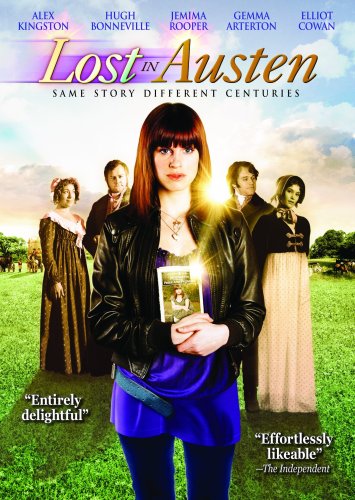
I’m apparently making a career out of talking about how things are stupid, so when I say that something is stupid you can probably trust me.
This is stupid.
This is the worst kind of pandering to the worst kind of stereotype of a Jane Austen fan. You know, the kind that claims to be so into it, but then you get to talking to them and you suspect they really knows nothing about her or her work, and are really more a fan of Colin Firth in a wet linen shirt.

This will be a familiar refrain to those of you who have been reading me for a while, but this mini-series is a gilded turd. The production values are exceptional, (someone involved knows about the Regency…) and the acting is good to excellent (Alex Kingston is a Mrs. Bennet I can get behind). But the problem is, wait for it, the writing.
The Protagonist is a complete moron. The plot could not have happened but for her overwhelming imbecility and lack of thought. And I don’t like to throw the term “Mary Sue” around, but four men fall in love with her. And everyone else puts up with her bullshit for no reason at all. The contrivances are so extraordinary that they beggar belief, and the lack of understanding of the characters and themes of the source material is just…. putting Wickham in leather pants? Really? This along with the casual use of homosexuality as a punchline honestly made me recheck to see who the writers on this thing were.
So avoid this work. It’s not good as an adaptation; it’s not good as TV.
Death Comes to Pemberley (2013)

If our previous selection is the worst Jane Austen fan fic has to offer, this is surely some of the best. This sequel to the novel could easily stand on its own as a decent historical murder mystery, but the addition of the beloved characters does add a good deal.
We see Elizabeth and Darcy several years into their marriage, and Lydia and Wickham several years into theirs. Elizabeth remains opinionated and independent, though more than capable of ordinary social interaction. Darcy remains a tad introverted, though his soft spot for his wife, and his respect for her advice are all very much in character.
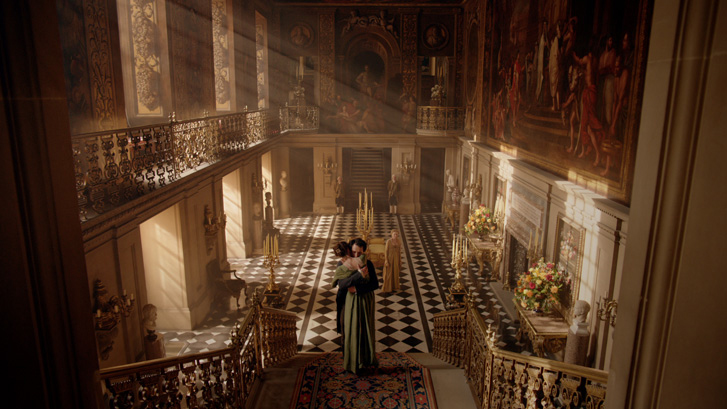
What they did with Lydia and her marriage interested me. I seem to like it when something is done with this character. Wickham is certainly not whitewashed; his actions in this work are a good deal more dickish than anything he did in Pride and Prejudice, but he is humanized in a way that is very engaging.
There are some characterization decisions that are not the ones I would have made, Colonel Fitzwilliam rather gets the Ron the Death Eater treatment, but even these are handled quite well, and plausibly.
The casting and acting are all excellent, the production value is high, and the writing is more than up to the challenge. This one is recommended.
So there it is; the only guide to P&P on film you will ever need. I’m sure Pride & Prejudice & Zombies will do full credit to the source material and join this illustrious company with its head held high.

